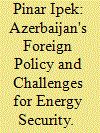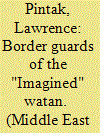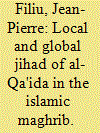| Srl | Item |
| 1 |
ID:
087742


|
|
|
|
|
| Publication |
2009.
|
| Summary/Abstract |
This article examines Azerbaijan's foreign policy by demonstrating the interplay between the oil-led development process and early post-independence regional conflicts that enforced a Western orientation in the country's foreign policy. It is argued that geopolitics continue to prevail in the strategic goals of Azerbaijan. However, the new challenges in the emerging framework of energy security, which extends beyond the revitalized geopolitical rivalries and preeminent concern over securing energy supplies, put Azerbaijan's foreign policy at a crossroads and require a new trans-Atlantic partnership to promote human security and to manage the risk entailed in the unpredictable policy environments of the Caspian region.
|
|
|
|
|
|
|
|
|
|
|
|
|
|
|
|
| 2 |
ID:
087740


|
|
|
|
|
| Publication |
2009.
|
| Summary/Abstract |
Media plays a fundamental role in the formation of national identity, most famously detailed in Benedict Anderson's theory of the imagined community. In the Arab world, a media revolution is contributing to the emergence of a reawakened regional Arab consciousness. A comparison of data from the first major regional survey of Arab journalists and the results of various public opinion polls in the region indicate that Arab journalists stand on the borderlands of Arab identity, shaping an emerging "imagined" watan [nation] that, in some ways, transcends the traditional lines in the sand that define the nation-state.
|
|
|
|
|
|
|
|
|
|
|
|
|
|
|
|
| 3 |
ID:
087741


|
|
|
|
|
| Publication |
2009.
|
| Summary/Abstract |
Al-Qa'ida in the Islamic Maghrib (AQIM) was founded in 2007 as the latest offshoot of the global jihad. But it is deeply rooted in a long and complex history of Algerian violence, with the "Afghan" volunteers in the 1980s, the civil war raging in the 1990s, and the more recent crisis of the jihadi networks. Despite all its global rhetoric, AQIM has not fully transcended its local dynamics, between its Kabylia strongholds and its Saharan groups.
|
|
|
|
|
|
|
|
|
|
|
|
|
|
|
|
| 4 |
ID:
087744


|
|
|
|
|
| Publication |
2009.
|
| Summary/Abstract |
This article examines the evolving relationship between Israel and the legal institutions of its Muslim minority since 1948. The Israeli case study demonstrates how, over the long run, an inherently conflictual relationship between a non-Muslim state and its Muslim minority can evolve into a mutual "agreement on how to disagree." This article integrates recently declassified archival materials with court decisions in order to challenge the dominant interpretation that emphasizes conflict between Israel and its Muslim citizens
|
|
|
|
|
|
|
|
|
|
|
|
|
|
|
|
| 5 |
ID:
087745


|
|
|
|
|
| Publication |
2009.
|
| Summary/Abstract |
From 1954 to 1964, the Ford Foundation attempted to implement an ambitious program of rural development in Iran. Through education, grassroots initiatives, and better credit, the Foundation hoped to transform Iran's peasant population into a base around which Iran would become a democracy. Its efforts, however, ultimately proved unsuccessful. This article argues that Ford's initiatives failed in part because its vision for the region was at odds with the goals of American foreign policy, which sought stability instead of democracy.
|
|
|
|
|
|
|
|
|
|
|
|
|
|
|
|